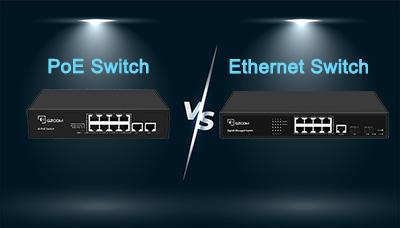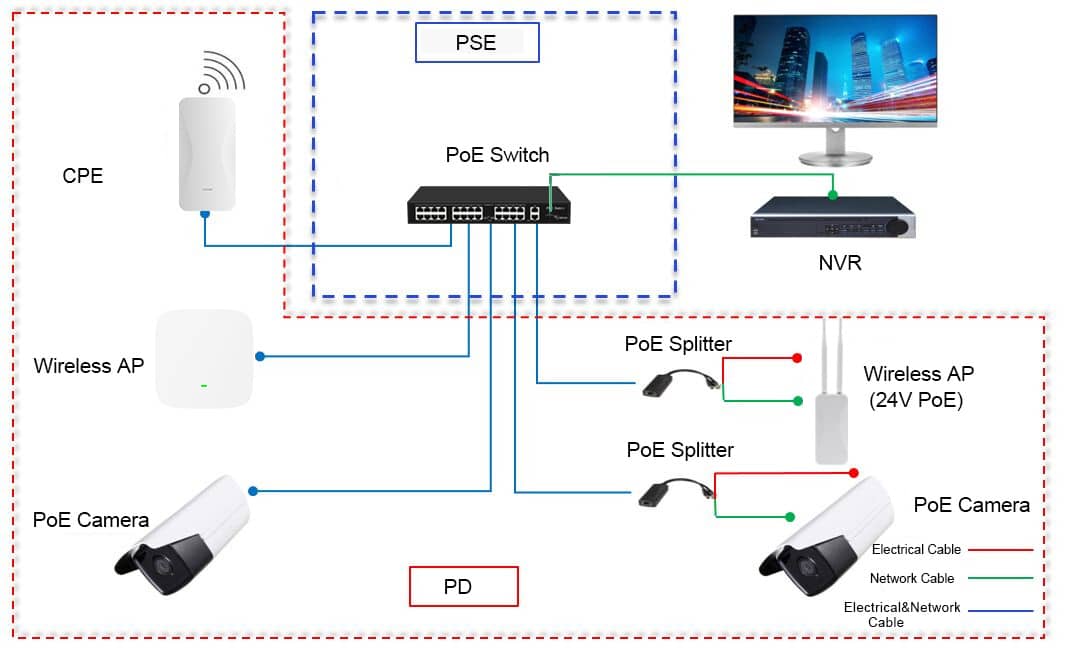PoE Switch vs Ethernet Switch: Which Is Right for You?

When we choose a switch. Usually people are torn between PoE Switch and Ethernet Switch, not knowing which switch is suitable for them. This article will take you through PoE Switch and Ethernet Switch, allowing you to choose the switch that suits you
What is an Ethernet switch
An Ethernet switch is a type of network hardware that is the foundation of networks and the Internet. It plays a vital role in connecting devices within a local area network (LAN) so that they can communicate with each other and access the Internet.
What is a Power over Ethernet (PoE) switch
A PoE Switch is a network device that combines the functionality of a standard network switch with the ability to deliver power to PoE-enabled devices. Unlike traditional switches that only transmit data, PoE switches can provide both data and power transmission over the same network cable. This eliminates the need for separate cords and power sockets, providing a leaner and more cost-effective solution for powering connected devices.
Advantages of PoE Switch
-
Extended network coverage: One of the most significant advantages of PoE switches is their cost-effectiveness. By transmitting DC power and data over the same Ethernet cable, PoE switches significantly extend network coverage. This allows devices such as security cameras or wireless access points to be installed far away from AC outlets, making it ideal for large-scale flexible network deployments.

-
Improved energy efficiency: PoE technology improves energy efficiency compared to traditional line voltage alternating current (AC) systems. The ability to provide low-voltage DC power can improve energy efficiency, especially in lighting applications. Although low-voltage Ethernet cabling has potential voltage drop issues, advances in the PoE standard have greatly increased the amount of power that can be transferred on a single cable.
-
Easy to install and configure (most are plug-and-play).
-
Cost-effectiveness: Energy-saving design. Configure power for each connected device.

Common uses for PoE Switches
The demand for PoE powered equipment continues to increase across various industries. These devices include Internet Protocol (IP) phones, security cameras, wireless access points, LED lighting systems, biometric readers, doorbell/access control systems, electric/gas meters, point-of-sale (PoS) systems, card readers, and thermometer sensors . In addition, a variety of applications in industries such as aerospace and defense rely on reliable and efficient power transmission systems.
PoE switch vs. Ethernet Switch
When comparing PoE switches to traditional power supplies, it is necessary to understand their fundamental differences in functionality and application.
How PoE Switches Work
PoE switches deliver data and power over a single Ethernet cable, allowing them to power devices such as IP cameras, VoIP phones, and access points without the need for additional power supplies. This innovative technology eliminates the need for separate wires, simplifying the installation process and reducing overall infrastructure costs.
Advantages of Ethernet Switch
In contrast, Ethernet Switch only provide data transmission functions without the additional function of providing power. These traditional switches are suitable for environments where power is readily available and power delivery does not need to be integrated into the network infrastructure.
| Feature | PoE Switch | Ethernet Switch |
| Functionality | Provides both data and power, suitable for PoE-enabled devices | Provides only data connectivity, does not provide power |
| Use Cases | Used for VoIP phones, IP cameras, Wi-Fi access points, etc. | Used to connect computers, servers, printers, etc. |
| Power Transmission | Provides power over Ethernet cables | Does not provide power |
| Management Level | Can be unmanaged or managed | Can be unmanaged or managed |
| Cost | Typically more expensive than regular switches | Usually more cost-effective |
Key differences to consider
The main difference between PoE switches and traditional power supplies is their ability to provide power simultaneously with data transmission. While PoE switches provide a comprehensive solution for powering network devices, traditional power supplies only focus on facilitating data communications within a network setup. Additionally, PoE switches can transmit power and data, while non-PoE switches only transmit data and not power.
By understanding these differences, businesses can make informed decisions when choosing the most appropriate network infrastructure for their specific requirements.
- Art
- Causes
- Crafts
- Dance
- Drinks
- Film
- Fitness
- Food
- Jocuri
- Gardening
- Health
- Home
- Literature
- Music
- Networking
- Alte
- Party
- Religion
- Shopping
- Sports
- Theater
- Wellness
- IT, Cloud, Software and Technology


